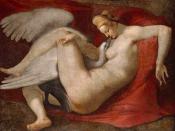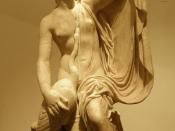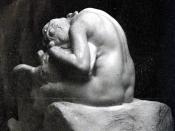Leda and the Swan
In the sonnet "Leda and the Swan", W.B Yeats retells the Greek myth of Leda's rape by Zeus, as he uses diction to emphasize the divinity of Zeus, and the helplessness of Leda. Most of the words used to identify Leda describe her physical aspects with helpless connotations, such as "the staggering girl (...) the nape (...) her helpless breast (...) those terrified vague fingers (...) the loosening thighs". On the other hand, the words used to identify Zeus are more metaphysical with strong, yet dark connotations as seen in "the great wings (...) the dark webs (...) caught in his bill (...) The feathered glory (...) his knowledge with his power". Throughout the sonnet there is a recurring contrast between the dark and harsh and the soft and sensual. Even the title itself when compared to the content of the actual poem contains this contrast.
In other words, "Leda and the Swan" has a romantic connotation, but in fact, the whole poem is about a rape. The poem starts with an interruption that is then followed by a pause, which is conveyed through the use of a colon. Then, there is an evident contrast between the 'great and might' Zeus with helpless 'earthly' Leda in "the great wings beating" and "above the staggering girl". Zeus demonstrates control over Leda as he overpowers her as seen in the word "staggering". Yeats also manages to blend the sensual with the sinister as he says "her thighs caressed/ By the dark webs". Leda's helplessness is continually emphasized as in "her nape caught in his bill,/ (...) her helpless breast upon his breast." In the next stanza, two rhetorical questions are asked, which, through the use of diction, compares the human versus the...



View
I think you could give your own personal comment on this poem and give some examples in the world nowadays to give envidents on your essay.
0 out of 2 people found this comment useful.